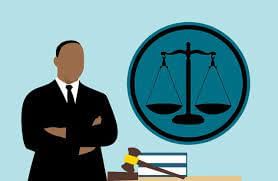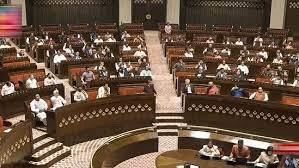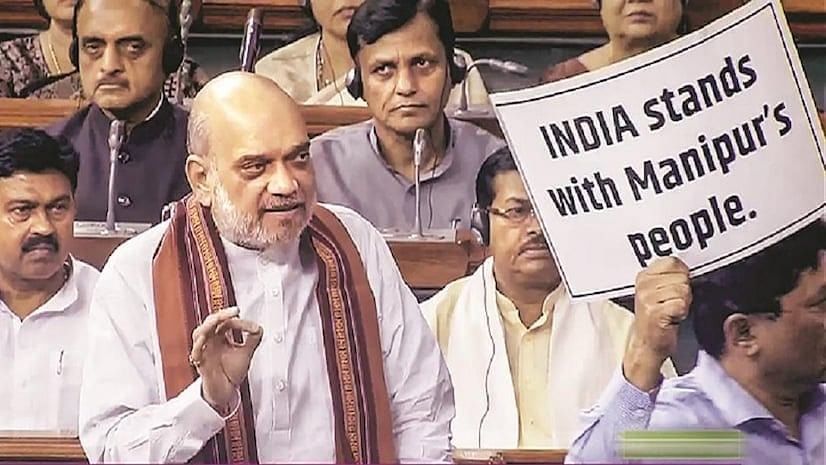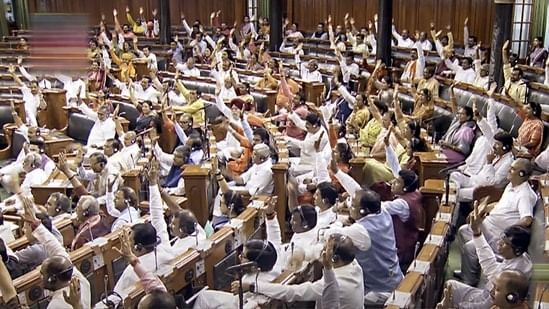Indian Polity and Governance - 2 | Current Affairs & Hindu Analysis: Daily, Weekly & Monthly - UPSC PDF Download
Reforming India’s Criminal Laws
The Union Home Minister has recently presented three new Bills in the Lok Sabha, aiming for a comprehensive transformation of the country's criminal justice system. These Bills include:
- The Bharatiya Nyay Sanhita Bill, 2023, which is set to replace the IPC, 1860.
- The Bhartiya Nagrik Suraksha Sanhita Bill, 2023, intended to supplant the CrPC, 1898.
- The Bharatiya Sakshya Bill, 2023, designed to take the place of the Evidence Act, 1872.
Background Information:
- The Indian Penal Code (IPC) is the official criminal code of India, formulated in 1860 following the establishment of the first law commission in 1834 under the Charter Act of 1833.
- The Code of Criminal Procedure (CrPC) outlines procedures for administering criminal law in India. Enacted in 1973, it came into effect on April 1, 1974.
- The Indian Evidence Act, initially passed in India by the Imperial Legislative Council in 1872 during the British Raj, encompasses a set of rules and related matters governing the admissibility of evidence in the Indian courts of law.
What Constitutes the Criminal Justice System?
- The criminal justice system encompasses a framework of laws, procedures, and institutions designed to prevent, detect, prosecute, and penalize crimes while safeguarding the rights and safety of individuals.
- This system includes entities like police forces, judicial institutions, legislative bodies, and complementary organizations such as forensic and investigative agencies.
Proposed Revisions in India’s Criminal Justice System:
Changes Envisaged in the Bharatiya Nyay Sanhita Bill, 2023:
- The bill delineates terrorism and various offenses like separatism, armed rebellion against the government, and challenging the sovereignty of the country, consolidating provisions that were previously scattered across different legal frameworks.
- It abolishes the offense of sedition, previously criticized as a colonial remnant restricting free speech and dissent.
- Capital punishment is prescribed as the maximum penalty for mob lynching, addressing a prevalent issue in recent times.
- A 10-year imprisonment proposal for engaging in sexual intercourse with women based on false promises of marriage, targeting common forms of deception and exploitation.
- Introduction of community service as a punitive measure for specific crimes, aiming to reform offenders and alleviate prison overcrowding.
- Setting a maximum limit of 180 days for filing a charge sheet to expedite the trial process and prevent undue delays.
Proposed Amendments in the Bhartiya Nagrik Suraksha Sanhita Bill, 2023:
- Advocacy for the use of technology in trials, appeals, and deposition recordings, allowing video-conferencing for proceedings.
- Mandatory video-recording of statements from survivors of sexual violence, preserving evidence and preventing coercion or manipulation.
- Police obligated to provide information on the status of a complaint within 90 days, fostering accountability and transparency.
- Renumbering Section 41A of the CrPC as Section 35, with an added safeguard requiring prior approval, especially for offenses punishable by less than three years or for individuals above 60 years.
- Police consultation with the victim before withdrawing a case punishable by seven years or more, ensuring justice is not compromised.
- Introduction of in-absentia trials for absconding criminals, discouraging fugitives from evading justice.
- Empowerment of magistrates to take cognizance of offenses based on electronic records like emails, SMSs, and WhatsApp messages, streamlining evidence collection and verification.
- Setting a 30-day deadline for filing mercy petitions in death sentence cases to the Governor and a 60-day deadline to the President, with no appeal against the President's decision permitted in any court.
Proposed Changes in Bharatiya Sakshya Bill, 2023:
- The bill defines electronic evidence as any information generated or transmitted by any device or system that is capable of being stored or retrieved by any means.
- It lays down specific criteria for admissibility of electronic evidence such as authenticity, integrity, reliability etc., which can prevent misuse or tampering of digital data.
- It provides for special provisions for admissibility of DNA evidence such as consent, chain of custody etc., which can enhance accuracy and reliability of biological evidence.
- It recognises expert opinion as a form of evidence such as medical opinion, handwriting analysis etc., which can assist in establishing facts or circumstances relevant to a case.
- It introduces the presumption of innocence as a fundamental principle of the criminal justice system, which means that every person accused of an offense is presumed to be innocent until proven guilty beyond reasonable doubt.
What are the Issues in the Current Criminal Justice System of India?
- Pendency of Cases: According to the National Judicial Data Grid, there are over 4.7 crore cases pending in Indian courts across different levels of the judiciary. This leads to delays in justice delivery, violation of the right to speedy trial, and loss of public trust in the system.
- Lack of Resources and Infrastructure: The criminal justice system suffers from inadequate funding, manpower, and facilities. There is a shortage of judges, prosecutors, police personnel, forensic experts, and legal aid lawyers.
- For a country of 135 million, there are only 21 judges per million population (as of February 2023).
- There are almost 400 vacancies in the high courts. And around 35% of the posts are lying vacant in the lower judiciary.
- Poor Quality of Investigation and Prosecution: The investigation and prosecution agencies often fail to conduct thorough, impartial, and professional investigations. They face interference from political and other influences, corruption, and lack of accountability.
- Human Rights Violations: The criminal justice system is often accused of violating the human rights of the accused, victims, witnesses, and other stakeholders. There are instances of custodial torture, extrajudicial killings, false arrests, illegal detentions, coerced confessions, unfair trials, and harsh punishments.
- Outdated Laws and Procedures: The criminal justice system is based on laws and procedures that were enacted by the British in 1860. These laws are archaic and not in tune with contemporary times. They do not address new forms of crimes such as cybercrime, terrorism, organised crime, mob lynching, etc.
- Public Perception: The Second ARC has noted that police-public relations are unsatisfactory in India because people view the police as corrupt, inefficient, and unresponsive, and often hesitate to contact them.
What are Committees’ and Their Recommendations to Reform the Criminal Justice System of India?
Vohra Committee, 1993:
- Aimed at addressing the criminalization of politics and the nexus between politicians, bureaucrats, criminals, and anti-social elements.
- Recommended the establishment of an institution to collect intelligence and take appropriate action against such elements.
Malimath Committee, 2003: Proposed various recommendations for overhauling the criminal justice system.
Key Recommendations:
- Introduction of 'social welfare offences' for minor violations.
- Replacement of the adversarial system with a 'mixed system.'
- Reduction of the standard of proof required for conviction.
- Making confessions before senior police officers admissible as evidence.
Madhav Menon Committee, 2007:
- Formed to draft a national policy on criminal justice.
- Suggested principles and strategies:
- Ensuring respect for human dignity and rights.
- Promoting restorative justice.
- Improving coordination among agencies involved in criminal justice.
Supreme Court Directives on Police Reforms, 2006:
- Issued seven directives for police reforms in response to a public interest litigation.
Key Directives:
- Setting up a State Security Commission.
- Ensuring fixed tenure for the Director General of Police.
- Separation of investigation and law and order functions.
- Establishment of a Police Complaints Authority.
Significance of Proposed Reforms:
- Aims to modernize and simplify outdated and complex criminal laws.
- Repeals the sedition law (Section 124A) criticized for misuse against dissenters.
- Introduces new offences like terrorism, corruption, mob lynching, and organized crime.
- Makes some sexual offences gender-neutral.
- Increases the use of electronic evidence and forensics.
- Empowers citizens to register complaints in any police station.
Issues in Current Proposed Reforms:
Lack of Consultation and Transparency:
- Drafted by the Criminal Law Reforms Committee, 2020, without representation from judiciary, bar, civil society, or marginalized communities.
- Committee did not make its report public for wider consultation.
Potential Violation of Human Rights:
- Criticized for using vague and broad terms that could infringe on human rights.
- Examples include new offences endangering sovereignty and admissible confessions before police.
Lack of Coherence and Consistency:
- Accused of inconsistency and contradiction with existing laws.
- Introduction of new standards like 'clear and convincing evidence' and 'social welfare offences' without clear definitions.
What Needs to be Done?
To address the challenges and potential shortcomings in the proposed reforms a more inclusive and comprehensive approach is needed.
- Inclusive Consultation: Initiate a broader consultation process involving all the stakeholders including the general public to accommodate diverse perspectives before implementing any reforms.
- Human Rights Safeguards: To explicitly incorporate human rights principles and safeguards clearly define and narrow down vague terms to prevent potential misuse.
- Coherent Legal Framework: Ensure consistency and coherence across the proposed bills and other existing laws.
- Technology Integration: Enhance the use of technology in the criminal justice process, including digitized evidence collection, online proceedings, and video-recorded statements for quicker trials, reduced backlog, and enhanced transparency.
- Capacity Building: Invest in training, recruitment, and infrastructure to bolster the capacity of law enforcement agencies, judiciary, and legal aid services. Adequate resources will lead to more efficient and fair administration of justice.
- Restorative Justice: Embrace restorative justice principles that focus on reconciliation, restitution, and rehabilitation to address the root causes of crime, reduce recidivism, and provide closure to victims.
- Public Awareness: Awareness campaigns to educate the public about their rights and responsibilities within the criminal justice system to improve police-public relations.
By pursuing these progressive steps, we as a nation can work towards a criminal justice system that upholds the rule of law, protects human rights, and effectively serves the needs of its diverse population.
The CEC and Other ECs (Appointment, Conditions of Service and Term of Office) Bill, 2023
The Chief Election Commissioner and Other Election Commissioners (Appointment, Conditions of Service, and Term of Office) Bill, 2023, has been endorsed by the Rajya Sabha. This bill delineates the procedures for the appointment of the Chief Election Commissioner (CEC) and Election Commissioners (EC).
- It strives to enhance transparency in the appointment process, aligning with a directive from the Supreme Court of India in the 2023 case of Anoop Baranwal v Union of India.
What Was the Supreme Court Verdict Regarding the Appointment of CEC and ECs?
- In March 2023, the Supreme Court underscored the pivotal role of an independent Election Commission of India (ECI) in ensuring fair elections, addressing a historical legislative void since the Constitution's adoption regarding the appointment of the Chief Election Commissioner (CEC) and Election Commissioners (ECs).
- The court highlighted other institutions upholding constitutional democracy that possess independent mechanisms for appointing their heads/members, citing examples such as the National and State Human Rights Commission, Central Bureau of Investigation (CBI), Information Commission, and Lokpal.
- Taking note of recommendations from the Dinesh Goswami Committee on Electoral Reforms (1990) and the Law Commission's 255th report on Electoral Reforms (2015), both proposing a committee comprising the Prime Minister, Chief Justice of India (CJI), and the Leader of the Opposition for appointing the CEC and ECs, the Supreme Court, utilizing its powers under Article 142, directed that the CEC and ECs shall be appointed by a committee consisting of the Prime Minister, the CJI, and the Leader of the Opposition or the largest opposition party in the Lok Sabha. The court ruled that this mechanism shall be in effect until Parliament enacts a law on this matter.
What are the Principal Provisions of the Bill?
The Bill serves as a replacement for the Election Commission (Conditions of Service of Election Commissioners and Transaction of Business) Act, 1991, addressing aspects of the appointment, salary, and removal of the CEC and ECs.
Appointment Process:
- The President will appoint the CEC and ECs based on the recommendation of a Selection Committee comprising the Prime Minister, a Union Cabinet Minister, and the Leader of the Opposition or leader of the largest opposition party in the Lok Sabha.
- The recommendations of the Selection Committee will remain valid even in the presence of a vacancy in this Committee.
- A Search Committee led by the Cabinet Secretary will propose a panel of names to the Selection Committee.
- Eligibility for the posts involves holding (or having held) a post equivalent to the Secretary to the central government.
Alterations in Salary and Conditions:
- The salary and conditions of service for the CEC and ECs will be commensurate with that of the Cabinet Secretary, deviating from the 1991 Act, where it equaled the salary of a Supreme Court Judge.
Removal Process:
- The Bill retains the constitutional provision (Article 324(5)), allowing the removal of the CEC akin to a Supreme Court Judge, while ECs can only be removed upon the recommendation of the CEC.
Protection for CEC and ECs:
- The amendment aims to shield the CEC and ECs from legal proceedings related to actions taken during their tenure, provided such actions were carried out in the discharge of official duties, safeguarding them from civil or criminal proceedings tied to their official functions.
How are the CEC and ECs Currently Appointed?
Constitutional Provisions:
- There are just five Articles (324-329) in Part XV (Elections) of the Constitution.
- The Constitution does not lay down a specific legislative process for the appointment of the CEC and ECs.
- Article 324 of the Constitution vests the “superintendence, direction and control of elections” in an Election Commission consisting “of the Chief Election Commissioner and such number of other Election Commissioners, if any, as the President may from time to time fix”.
- The President makes the appointment on the advice of the Union Council of Ministers headed by the Prime Minister.
- The Law Minister suggests a pool of suitable candidates to the Prime Minister for consideration. The President makes the appointment on the advice of the PM.
Removal:
- They can resign anytime or can also be removed before the expiry of their term.
- The CEC can be removed from office only through a process of removal similar to that of a SC judge by Parliament.
- Any other EC cannot be removed except on the recommendation of CEC.
What are the Concerns Regarding the Bill?
Transparency and Independence:
- Allowing the Selection Committee's recommendations to be valid even with a vacancy could result in a monopoly of ruling party members during certain circumstances, undermining the diversity and independence of the committee.
Shift from Judicial Benchmark to Executive Control:
- Equating the salary of the CEC and ECs with that of the Cabinet Secretary, whose salary is determined by the executive, raises concerns about potential government influence.
- Unlike the salary of a Supreme Court Judge, which is fixed by an Act of Parliament, this shift may compromise the financial independence of the EC.
Limiting Eligibility to Civil Servants:
- Restricting eligibility to individuals who have held a position equivalent to the Secretary to the government may exclude potentially qualified candidates, limiting the diversity of backgrounds and expertise in the ECI.
Concerns About Lack of Parity:
- The Bill retains the constitutional provision that allows the CEC to be removed like a Supreme Court Judge, while ECs can only be removed on the recommendation of the CEC.
- This lack of parity in removal processes may raise questions about fairness.
International Practices in the Selection of Electoral Body Members
South African Model:
- Within South Africa, the selection procedure incorporates prominent figures such as the President of the Constitutional Court, representatives of the Human Rights Court, and advocates for gender equality.
- A focus on diverse representation aims to bring a broader perspective to the electoral body.
United Kingdom Approach:
- In the United Kingdom, candidates vying for positions within the electoral body undergo approval by the House of Commons.
- The inclusion of Parliament in the process adds an additional layer of scrutiny and accountability to the selection mechanism.
United States Procedure:
- In the United States, members of the electoral body are appointed by the President, with appointments requiring confirmation by the Senate.
- This dual-check system is designed to maintain a balance of power and prevent unilateral decisions.
Government of National Capital Territory of Delhi (Amendment) Bill, 2023
The Parliament has approved the Government of National Capital Territory of Delhi (Amendment) Bill, 2023, replacing the ordinance concerning the regulation of services in Delhi.
Background:
- Article 239 AA was incorporated into the Constitution through the 69th Constitutional Amendment Act of 1991, following the recommendations of the S Balakrishnan Committee in 1987. This amendment granted special status to Delhi, establishing the National Capital Territory (NCT) with both an Administrator and a Legislative Assembly.
- The Legislative Assembly is empowered to enact laws for the entire NCT or specific parts thereof, concerning matters in the State List or Concurrent List, as long as they are applicable to Union territories. However, the assembly is restricted from legislating on Police, Public Order, and Land.
- In recent years, governance in the NCT has become a source of contention between the Delhi government and the Lieutenant Governor (L-G).
Central & Delhi Government’s Arguments
- Arguments from the Central and Delhi Governments diverge on the issue. The Delhi government contends that, in the spirit of federalism, elected representatives should have authority over transfers and postings.
- Conversely, the Central Government consistently asserts that, as the national capital and the face of the country, it must maintain control over administrative services, encompassing appointments and transfers.
Control Over Administrative Services
- In 2019, a two-judge bench of the Supreme Court rendered a split verdict on the issue of who holds control over administrative services in Delhi. The bench recommended the establishment of a three-judge bench to address the matter of administrative services control.
- Subsequently, in May 2022, a three-judge bench referred the case to a larger bench based on the Central government's plea, emphasizing the need for further examination of the question of control over administrative services.
- In May 2023, a five-judge constitutional bench of the Supreme Court ruled that the Delhi Government would have legislative and executive control over administrative services in the National Capital Territory of Delhi (NCTD), excluding matters related to public order, police, and land.
- Previously, decisions on these issues were made by the Lieutenant Governor, Chief Secretary, and the Secretary of the Services Department.
Government of National Capital Territory of Delhi (Amendment) Ordinance, 2023
- Following the Supreme Court's judgment favoring the Delhi Government regarding control over administrative services, the President promptly promulgated the Government of National Capital Territory of Delhi (Amendment) Ordinance, 2023.
- The ordinance aims to establish a comprehensive administration scheme for services, balancing the local and domestic interests of Delhi residents with the democratic will of the entire nation as reflected through the President of India.
- The ordinance restored power over services to the Lieutenant Governor, requiring the LG to consult the Chief Minister only at his discretion.
News Summary
The Government of National Capital Territory of Delhi (Amendment) Bill, 2023, has successfully passed through both Houses of Parliament, replacing the previously enacted ordinance governing services in Delhi. The key provisions of the bill are as follows:
National Capital Civil Services Authority (NCCSA):
- The bill establishes the National Capital Civil Services Authority, tasked with advising the Lieutenant Governor (LG) on specific service-related matters. These include transfers and postings, issues related to vigilance, disciplinary proceedings, and prosecution sanctions concerning Group A of All India Services (excluding the Indian Police Service) and DANICS.
- The Authority comprises the Chief Minister of Delhi as Chairperson, the Principal Home Secretary of the Delhi government as Member Secretary, and the Chief Secretary of the Delhi government as a member. The central government will appoint both the Principal Home Secretary and Chief Secretary. Decisions of the Authority will be made through a majority vote of the members present and voting.
Powers of the LG:
- The Act delineates matters where the LG may exercise discretion, such as those falling outside the legislative competence of the Delhi Legislative Assembly but delegated to the LG or situations where a law requires him to act with discretion or perform judicial or quasi-judicial functions. In such cases, the LG will act at his sole discretion.
- The bill expands the LG's discretionary role by granting him the authority to approve or return the recommendations of the Authority for reconsideration. In instances of a disagreement between the LG and the Authority, the LG's decision will be deemed final.
Disposal of Matters by Ministers:
- A Minister of the Delhi government is empowered to issue standing orders for the disposal of matters brought to their attention, with consultation from the relevant Department Secretary.
- However, certain matters necessitate submission to the LG through the Chief Minister and Chief Secretary for consideration before issuing any orders.
Duties of Secretaries:
- Furthermore, Department Secretaries are obligated to bring specific matters to the attention of the LG, Chief Minister, and Chief Secretary.
- These matters include those that might involve the Delhi Government in disputes with the central or any state government, as well as legal proceedings in the Supreme Court or High Court of Delhi.
No Confidence Motion
Lok Sabha Speaker Om Birla has accepted a no-confidence motion against the incumbent government. The motion was put forth by Congress MP Gaurav Gogoi, representing the opposition parties of the I.N.D.I.A alliance.
What is a No-Confidence Motion?
- In a parliamentary democracy, a government can maintain its position only if it holds a majority in the directly elected House. Article 75(3) of the Constitution encapsulates this principle by stating that the Council of Ministers is collectively accountable to the Lok Sabha.
- To assess this collective responsibility, the Lok Sabha has established a specific mechanism known as a motion of no-confidence, as outlined in Rule 198 of the Lok Sabha. Notably, the Constitution does not explicitly mention either a Confidence or a No-Confidence Motion.
Who can initiate a No-Confidence Motion?
- Any Member of Parliament in the Lok Sabha, with the ability to gather the support of 50 colleagues, can introduce a motion of no-confidence against the Council of Ministers. It is crucial to note that a no-confidence motion can only be initiated in the Lok Sabha and is not applicable to the Rajya Sabha.
How is a No-Confidence Motion Debated and Voted?
- The motion is moved by the member who submitted it, and the government will then respond to the motion.
- The opposition parties will then have the opportunity to speak on the motion.
- After the debate, the Lok Sabha will vote on the no-confidence motion.
- The motion will be passed if it is supported by a majority of the members of the House.
- If a no-confidence motion is passed, the government must resign.
What happens if the Government wins the vote on the No-Confidence Motion?
- If the government wins the vote on the no-confidence motion, the motion is defeated and the government remains in power.
How many No-Confidence Motions have been introduced since Independence?
- There have been 27 no-confidence motions introduced in the Lok Sabha since independence.
- The first no-confidence motion against the administration of the then Prime Minister Jawaharlal Nehru was presented in the Lok Sabha in August 1963.
- The motion obtained only 62 votes in favor and 347 votes against it.
- The last no-confidence motion was moved in 2018 against the then NDA government.
|
59 videos|5398 docs|1143 tests
|




















